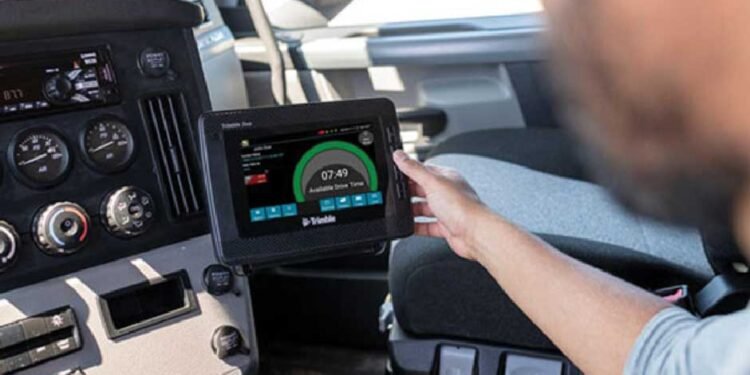Introduction to ELDs
Electronic Logging Devices (ELDs) have fundamentally changed the landscape of fleet management, bringing digital precision to an industry that has long relied on paper logs. But what exactly are ELDs, and why are they becoming a cornerstone in modern logistics?
ELDs are digital devices that automatically record a driver’s driving time and other aspects of driving hours of service (HOS). By capturing data directly from the vehicle’s engine, ELDs offer real-time tracking and reliable hours logging, replacing often inaccurate paper logs. This ensures compliance with regulatory standards and fosters greater operational efficiency. As fleet management becomes more complex, the role of ELDs in maintaining compliance and efficiency cannot be overstated.
Benefits of ELDs for Fleet Management
Adopting ELDs can significantly improve fleet management in several ways. An eld device automates recording driving hours, reducing manual errors and compliance issues for fleet operators. First and foremost, they provide accurate logging of driving hours, which is crucial for maintaining compliance with federal regulations. Moreover, ELDs help reduce fuel consumption by optimizing routes and identifying idle times.
According to a recent study on how technology is evolving fleet management, companies that use ELDs have seen up to a 20% reduction in fuel costs. Beyond fuel efficiency, ELDs also minimize administrative burdens by automating data collection and reporting, freeing up valuable time for fleet managers and drivers alike. This increased efficiency can translate to significant cost savings and a more streamlined operation, ultimately boosting the profitability and sustainability of the fleet.
How ELDs Enhance Safety
One of the standout benefits of using ELDs is the enhanced safety they bring to the table. ELDs allow for real-time vehicle tracking, which can be crucial in emergenciesemergencies. Additionally, ELDs facilitate proactive maintenance schedules by alerting fleet managers to potential issues before they become significant problems. This prevents breakdowns and minimizes the risk of accidents due to mechanical failures.
Furthermore, by ensuring drivers do not exceed their allowed driving hours, ELDs reduce fatigue-related accidents. This creates a safer environment not just for the drivers but for everyone on the road. Enhanced safety protocols can also translate to lower insurance premiums for fleet operators, adding another financial benefit to ELD adoption. The safety advantages are thus multi-faceted, covering both immediate and long-term aspects of fleet operation.
ELD Compliance and Regulations
Compliance with ELD mandates is essential for all fleet operators. The Federal Motor Carrier Safety Administration (FMCSA) has set stringent guidelines requiring ELDs to ensure accurate tracking of driving hours. The main goal of these regulations is to enhance road safety and create a standardized logging system across the industry.
Fleet managers must stay up-to-date with FMCSA guidelines to ensure compliance. Non-compliance can result in substantial fines and even suspension of operations, making ELDs a technological advancement and a regulatory necessity. Understanding and adhering to these regulations is crucial for the sustainability and legality of any fleet operation. Compliance is not merely about avoiding penalties but about fostering a culture of safety and efficiency within the organization.
Case Studies: Success with ELD Implementation
Many companies have experienced tangible benefits after implementing ELDs. For instance, a logistics company based in Texas saw a 15% boost in on-time deliveries and a significant reduction in fuel costs after integrating ELDs into their fleet. The implementation process was smooth, and the benefits were quickly realized, showcasing the transformative potential of ELDs.
Another success story comes from a trucking company in California that noticed a 30% decrease in paperwork and manual errors, drastically improving operational efficiency and driver satisfaction. These case studies demonstrate the real-world benefits that ELDs offer beyond just compliance and safety. The practical advantages include improved customer satisfaction, reduced operational costs, and a more motivated workforce, making ELDs a must-have in the modern fleet management toolkit.
Challenges and Solutions in ELD Adoption
While the advantages of ELDs are numerous, their adoption comes with its challenges. Some fleet managers resist the transition due to the initial costs of purchasing and integrating the devices. Additionally, there might be a learning curve for drivers using paper logs.
However, these hurdles can be overcome with the right strategies. Companies can start by rolling out ELDs gradually, allowing time for adaptation and training. Financially, the long-term savings in fuel costs and reduced administrative burden often outweigh the initial investment, justifying the expense. Implementing training programs and providing continuous support can make the transition smoother, helping the workforce adapt to the new technology without resistance.
The Future of ELD Technology
The technology behind ELDs is continually evolving, with future advancements promising to enhance their benefits further. Innovations such as machine learning and artificial intelligence are set to make route optimization and predictive maintenance even more efficient. These technologies will enable fleets to operate more smoothly, anticipating issues before they arise and optimizing every aspect of the journey.
Moreover, integrating ELDs with other technologies, such as telematics and IoT, will unlock new possibilities in data analytics, offering more profound insights into fleet performance and operational efficiency. The future of ELD technology is full of potential and poised to bring even more incredible transformations to the fleet management industry. These advancements will make fleets more efficient and contribute to a higher standard of safety, compliance, and profitability.
Conclusion and Final Thoughts
Electronic Logging Devices (ELDs) are more than just a regulatory requirement—they are a pivotal component in modern fleet management. From enhancing safety and compliance to improving operational efficiency, the benefits of LEDs are manifold. The technology behind ELDs continues to evolve, promising even more significant advantages in the future.
As technology advances, the role of ELDs in fleet management will only grow, making it essential for fleet operators to embrace this change. The case studies and future possibilities discussed here highlight the undeniable value that ELDs bring to the table, marking them as indispensable tools in the industry. By adopting ELDs, fleet managers comply with regulations and pave the way for a more efficient, safer, and cost-effective operation.












